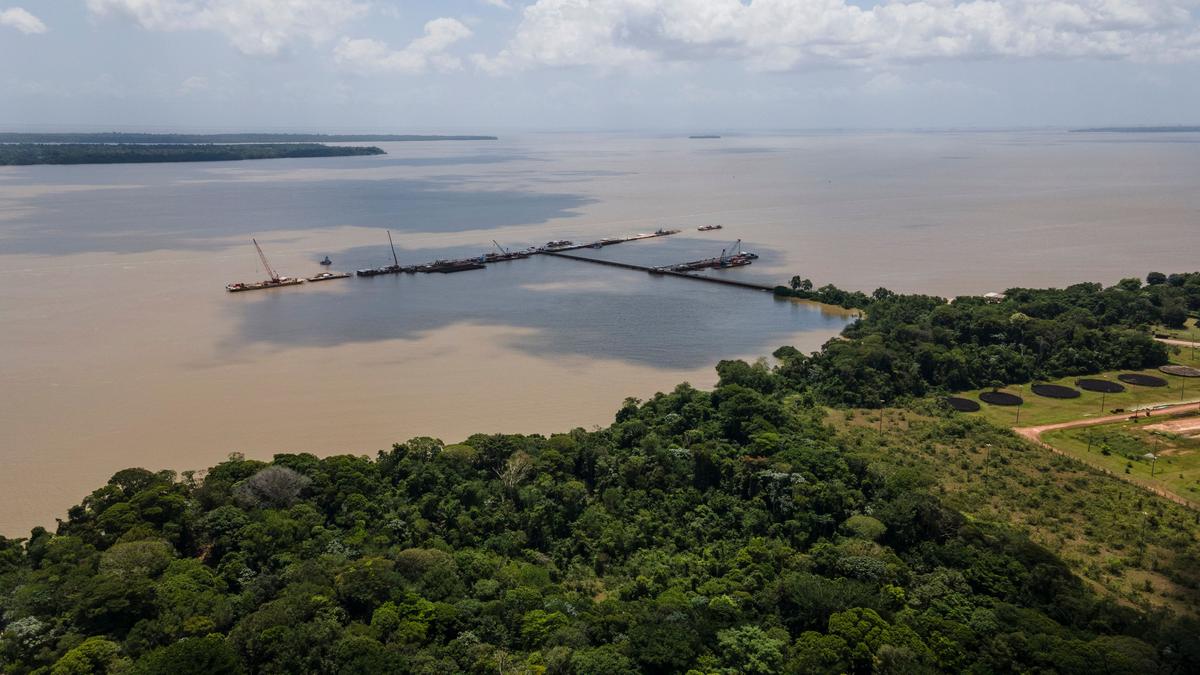Aerial view of the Outeiro port at the Para river in Belem, Para State, Brazil on August 25, 2025. Brazil will host the UN climate conference COP30 in November in the Amazonian city of Belem.
| Photo Credit: AFP
Instead of big-ticket announcements, the forthcoming edition of the U.N. climate summit is expected to focus on “well known solutions”, with the host country, Brazil, moving to cleave the “negotiations” aspect of climate talks from the “implementation” of agreements.
The UN Framework Convention on Climate Change (UNFCCC) will hold its 30th Conference of Parties (COP-30) in November, in the Brazilian port city of Belem, a gateway to the Amazonian rainforest.
With U.S. President Donald Trump having withdrawn his country from the UNFCCC’s Paris Agreement for the second time and casting global trade into flux with his tariffs, diplomats and seasoned climate negotiators said that this was a “difficult year and things could go bad” for the COP process. However, COP-30 president André Corrêa do Lago, a Brazilian Minister, insisted that there are also “grounds for optimism”. Addressing a conclave organised here by the Council on Energy Environment and Water (CEEW), “In the run-up to COP-30, we are trying to de-couple the process of negotiation – and agreements like the UNFCCC are designed for negotiation – from that of implementation.”
‘Implement agreed text’
The typical process of climate negotiations in most COPs focusses on creating a “text”, said Mr. Lago, noting that it was “horribly difficult” to assemble all countries and have them agree on one. “However, once we have a text, one must use it and not just think of the next text… People have responded very well to the fact that we are looking to use this [year’s] text for implementing what we have already agreed upon.”
The Paris Agreement ironed out at COP-21 in 2015 is considered historic because it committed all countries, not just developed countries, to take action to contain greenhouse gas emissions to keep the increase in average global temperatures from exceeding 2 degrees Celsius and “as far as possible below 1.5C” by the turn of the century. However, several scientific assessments suggest that the impact of all countries’ current commitments, even if implemented, will still lead to an increase of more than 2.6 C, though the U.N. still hopes that the Paris targets may be achieved.
Non-government action needed
One of the reasons for tardy climate action is that multilateralism, or getting all countries to agree upon decisive action, is challenging given competing interests. There has been a chorus building up over the years that there are ‘limits’ to what professional diplomats representing their countries at the conferences can achieve, with many saying it is increasingly up to non-government actors to take bolder action towards limiting emissions.
“At the very worst, it could be that we spend two weeks and countries are unable to agree upon an agenda,” said Ana Toni, an economist and CEO of the COP 30 Presidency. “On the other hand, all countries have agreed upon the direction in which we must be moving. This means increasing renewable energy use, re-forestation, making agriculture more resilient. There are several solutions already, but maybe Brazil does not know what is happening in India and India unaware of that in Brazil. What we need is to involve sub-national governments (states, cities etc), businesses, independent think tanks, and go problem by problem and figure out why can’t we go faster.”
Back-room deals
The Paris Agreement was made possible by a “back-room deal” between Chinese President Xi Jinping and then-U.S. President Barack Obama, according to Mohan Kumar, who was India’s Ambassador to France at the time. He explained how they had “unblocked” the impasse in the negotiations, though their deal also broke the solidarity between a coalition of countries called BASIC (Brazil, South Africa, India, and China). “The problem today is that there is no one to do such a back-room deal unless President Trump changes his mind and goes to Beijing and a lot of other things happen… This an opportunity for several other actors, for instance, individual cities in India, to take a lead,” he added.

A key achievement of COP-29, held last November in Baku, Azerbaijan, was that countries agreed to a new climate finance goal of $300 billion per year by 2030. While this is a hike from the earlier goal of $100 billion annually by 2025, it is still far short of the $1.3 trillion that is reportedly needed to achieve the Paris Agreement’s goals.
Published – September 02, 2025 10:13 pm IST
